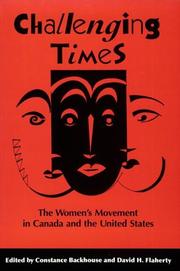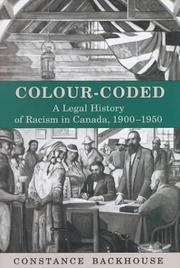| Listing 1 - 7 of 7 |
Sort by
|
Book
ISBN: 1280690984 9786613667922 2760318427 2760326241 2760307182 9782760318427 9781280690983 Year: 2010 Publisher: Les Presses de l’Université d’Ottawa | University of Ottawa Press
Abstract | Keywords | Export | Availability | Bookmark
 Loading...
Loading...Choose an application
- Reference Manager
- EndNote
- RefWorks (Direct export to RefWorks)
Malgré l’ouverture proclamée des Canadiens face à la diversité ethnique et culturelle, l’histoire canadienne n’en est pas moins marquée par la discrimination systématique. Cet ouvrage expose la ténacité juridique de cette discrimination par l’entremise d’un examen de six arrêts judiciaires déterminants entre 1900 et 1950 qui démontrent comment le système juridique canadien fut complice de la discrimination raciale. Les cas retenus font exemples des diverses façons dont le racisme a opéré dans les différents environnements juridiques du Canada. On y retrouve ceux d’Eliza Sero, qui a présenté en 1921 une revendication à la souveraineté Mohawk, de Wanduta, un Heyoka de la nation Dakota, qui visait à faire reconnaître son droit de célébrer la traditionnelle danse des herbes sacrées en 1903, d’Ira Johnson, qui a eu à subir le courroux du Ku Klux Klan en raison de son désir de contracter un mariage mixte en 1930, de Yee Clun, un restaurateur canadien d’origine chinoise à qui l’on avait refusé le droit d’employer des femmes blanches en 1924 et de Viola Desmond, qui avait été empêchée par le personnel d’un cinéma de s’asseoir dans une section réservée aux Blancs en 1946. De la couleur des lois illustre l’ambiguïté opérationnelle ainsi que l’étonnante et sournoise persévérance du racisme à l’oeuvre dans le système juridique canadien. De la couleur des lois est la traduction française de Colour-Coded: A Legal History of Racism in Canada (University of Toronto Press, 1999), qui a été gagnant du prix Joseph Brant en 2002.
Ethnic and cultural diversity. --- History. --- Race relations. --- Law - Non-U.S. --- Law, Politics & Government --- Law - Canada --- Discrimination raciale --- Race discrimination --- Droit --- Histoire --- Law and legislation --- History --- Bias, Racial --- Discrimination, Racial --- Race bias --- Racial bias --- Racial discrimination --- Discrimination --- Canada --- racisme --- discrimination --- droit --- jurisprudence
Book
ISBN: 2760335674 9782760335677 9780776636719 0776636715 0776636685 9780776636689 Year: 2021 Publisher: Ottawa
Abstract | Keywords | Export | Availability | Bookmark
 Loading...
Loading...Choose an application
- Reference Manager
- EndNote
- RefWorks (Direct export to RefWorks)
"Bertha Wilson et Claire L’Heureux-Dubé ont été les premières femmes juges à la Cour suprême du Canada. L’une représentait le Canada anglais, l’autre le Québec. De milieux et de tempéraments opposés, les deux femmes ont affronté des défis similaires. Leurs nominations judiciaires dans les années 1980 ont ravi les féministes et bousculé l’establishment juridique. Constance Backhouse plonge ici au coeur des obstacles sexistes que les deux femmes ont affrontés en éducation, en pratique du droit et dans les cours de justice. Elle explore les divers moyens que celles-ci ont utilisés pour les surmonter, de même que les décisions marquantes qu’elles ont prises pour défendre les droits des femmes et leur traitement mitigé de la question raciale. Explorer les vies et les carrières de ces deux pionnières, c’est s’aventurer dans un monde de sexisme légal appartenant à une époque passée. Quand L’Heureux-Dubé a voulu s’inscrire à la Faculté de droit de l’Université Laval (défiant ainsi son père), un fonctionnaire de l’université lui a répondu que le droit était une discipline « réservée aux hommes ». Quand Bertha Wilson est entrée à la Faculté de droit de Dalhousie University, le doyen lui a suggéré de « retourner à la maison et se mettre au crochet ». Rappeler leurs efforts que ces deux femmes ont déployés pour naviguer dans une tempête de sexisme révèle les fondements des inégalités de genre dans notre passé. La question est maintenant : quelle part de ce sexisme a été relégué aux poubelles de l’histoire et quelle part continue de nous hanter ?"--
Femmes juges --- Juges --- L'Heureux-Dubé, Claire. --- Wilson, Bertha. --- Canada. --- Feminism. --- Gender Inequality. --- Law. --- Lawyers. --- Sexism. --- Supreme Court of Canada . --- Trailblazers. --- Women.
Book
ISBN: 0138075379 Year: 1981 Publisher: Londen Prentice-Hall
Abstract | Keywords | Export | Availability | Bookmark
 Loading...
Loading...Choose an application
- Reference Manager
- EndNote
- RefWorks (Direct export to RefWorks)
Sociology of the family. Sociology of sexuality --- Sociology of work --- Law --- International --- Labour --- Sexual intimidation --- Book --- Experiences

ISBN: 1282855964 9786612855962 0773563423 9780773563421 0773509100 9780773509108 0773509194 9780773509191 9781282855960 6612855967 Year: 1992 Publisher: Montreal, Que. McGill-Queen's University Press
Abstract | Keywords | Export | Availability | Bookmark
 Loading...
Loading...Choose an application
- Reference Manager
- EndNote
- RefWorks (Direct export to RefWorks)
By allowing the reader to draw comparisons between women's movements in Canada and the United States, Challenging Times shows that certain political and theoretical issues transcend international borders, ebbing and flowing between the two countries symbiotically. Topics discussed include the origins of "second-stage feminism," the strength of the women's movement within academic structures, and the challenges posed by racial, ethnic, and class diversity; violence against women; the promise and limits of legal reform; reproductive technology; and economic discrimination. Readers who are interested in the recent history of the North American women's movement will find answers to many of their questions about the victories, defeats, and fundamental challenges facing modern feminism. Those who have been active in the current wave of feminism, either as central participants or serious critics, will find Challenging Times equally fascinating because it endeavours to provide answers to pressing questions about the nature of feminism, the inter-relationships and tensions between different sectors of the movement, and the prospects for future growth. Many of the contributors to this volume have lived through and personally shaped the unfolding of the rich history of North American feminism. In addition to Backhouse and Flaherty, the contributors are Catharine A. MacKinnon, Greta Hofmann Nemiroff, Monique Bégin, Mariana Valverde, Naomi Black, Marjorie Griffin Cohen, Micheline de Sève, Micheline Dumont, Margrit Eichler, Sara M. Evans, Marianne A. Ferber, Lorraine Greaves, Marjorie Heins, M. Patricia Fernández Kelly, Patricia A. Monture-Okanee, Arun Mukherjee, Jean F. O'Barr, Christine Overall, Glenda Simms, and Jill Vickers.
Feminism --- Emancipation of women --- Feminist movement --- Women --- Women's lib --- Women's liberation --- Women's liberation movement --- Women's movement --- Social movements --- Anti-feminism --- Emancipation

ISBN: 0802047122 0802082866 Year: 1999 Publisher: Toronto : Osgoode Society for Canadian Legal History by University of Toronto Press,
Abstract | Keywords | Export | Availability | Bookmark
 Loading...
Loading...Choose an application
- Reference Manager
- EndNote
- RefWorks (Direct export to RefWorks)
Discrimination in justice administration --- Discrimination in justice administration --- Race discrimination --- Discrimination dans l'administration de la justice --- Discrimination dans l'administration de la justice --- Discrimination raciale --- Cases --- History --- History --- Jurisprudence --- Histoire --- Histoire
Book
ISBN: 0228009111 022800912X 9780228009122 9780228009115 Year: 2021 Publisher: Montreal Kingston London Chicago
Abstract | Keywords | Export | Availability | Bookmark
 Loading...
Loading...Choose an application
- Reference Manager
- EndNote
- RefWorks (Direct export to RefWorks)
Written primarily by current Royal Society of Canada members, these essays explore the historical contribution of the RSC to the production of ideas and policies that shored up white settler privilege, underpinning the disastrous interaction between Indigenous peoples and white settlers. Royally Wronged poses difficult questions about what is required to move meaningfully toward reconciliation.
Colonization. --- Decolonization. --- Indigenous peoples --- Knowledge, Sociology of. --- Learned institutions and societies --- History. --- Royal Society of Canada. --- Canada. --- Indian Canadian scholarly writing. --- Indigenous knowledge. --- colonial settler research. --- critical race studies. --- decolonisation. --- duncan campbell scott. --- erasure Indigenous expertise. --- exclusion outsiders. --- exclusive fellowship. --- legitimation knowledge. --- networks knowledge. --- pauline johnson. --- post colonial academy. --- royal society canada. --- truth reconciliation. --- white elite scholarship.
Book

ISBN: 0228012252 Year: 2022 Publisher: Montreal ; Kingston ; London ; Chicago : McGill-Queen's University Press,
Abstract | Keywords | Export | Availability | Bookmark
 Loading...
Loading...Choose an application
- Reference Manager
- EndNote
- RefWorks (Direct export to RefWorks)
As the leading legal historian of his generation in Canada and professor at McGill University for over three decades, Blaine Baker (1952–2018) was known for his unique personality, teaching style, intellectual cosmopolitanism, and deep commitment to the place of Canadian legal history in the curriculum of law faculties.Law, Life, and the Teaching of Legal History examines important themes in Canadian legal history through the prism of Baker’s career. Essays discuss Baker’s own research, his influence within McGill’s law faculty, his complex personality, and the relationship between the private and the public in the life of a university intellectual at the turn of the twenty-first century. Inspired by topics Baker took up in his own writing, contributors use Baker’s broad interests in legal culture to reflect on fundamental themes across Canadian legal history, including legal education, gender and race, technology, nation building and national identity, criminal law and marginalized populations, and constitutionalism.Law, Life, and the Teaching of Legal History offers a contemporary analysis of Canadian legal history and thoughtfully engages with what it means to honour one individual’s enduring legacy in the study of law.
Law --- History --- Study and teaching --- History. --- Canada. --- McGill. --- biography. --- criminal. --- education. --- faculties. --- gender. --- history. --- legal curriculum. --- marginalized populations. --- nation building. --- national identity. --- pedagogy. --- race. --- school. --- technology. --- university.
| Listing 1 - 7 of 7 |
Sort by
|

 Search
Search Feedback
Feedback About UniCat
About UniCat  Help
Help News
News